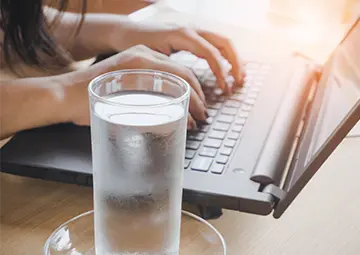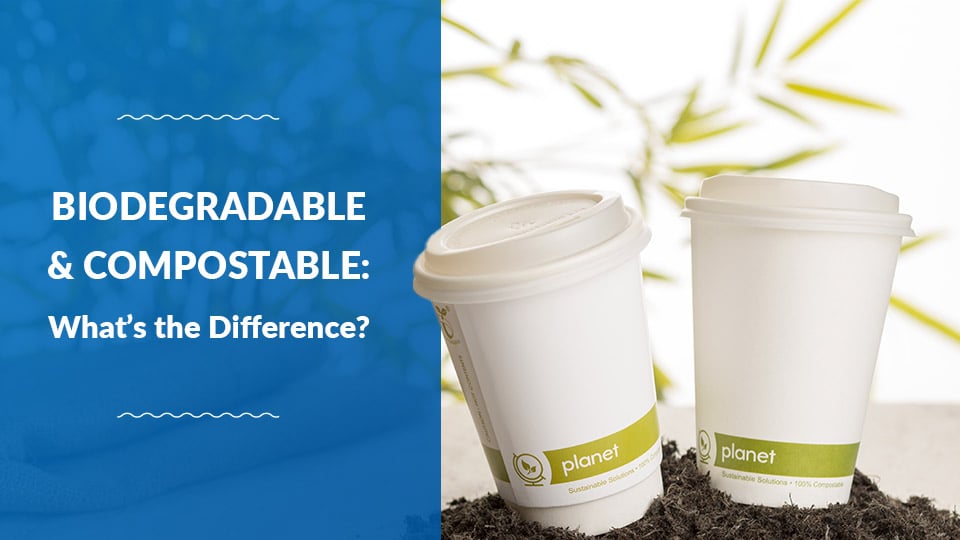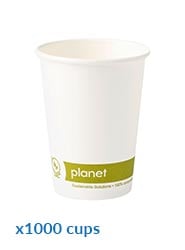Biodegradable and Compostable: What is the difference?
Updated 04/05/2022
The plastic-free revolution has started and our daily vocabulary has been enriched with new terms; biodegradable and compostable. We are beginning to see a lot of biodegradable plastic and compostable products, but do we know what that actually means?
In 2021, the European Union brought out new legislation that meant the use of disposable plastic objects was prohibited: cutlery, plates, glasses, but also straws and food containers must be made of alternative, biodegradable and compostable materials. The UK is following suit in 2023 by bringing in legislation to ban single-use plastics.
The phenomenon of degradation is part of the natural cycles of the Earth. There are many materials that degrade. However, the time in which the decomposition takes place varies. For some materials it is a process that is not at all rapid nor much less without consequences: plastic takes hundreds of years to degrade and never completely decomposes. It is also made up of polluting raw materials - such as oil - which return to nature with extremely harmful effects on the entire ecosystem.
In comes eco-packaging, a sustainable and ecological solution — where biodegradable and compostable are frequently used when talking about eco-packaging. However, do we really know what ‘compostable’ and ‘biodegradable' mean? Just because something is biodegradable, doesn't mean it is necessarily compostable. Knowing the true meaning of these words is the first step to changing our habits around the environment for the better.
What's the difference between biodegradable and Compostable?
Definitions
- A biodegradable material is able to break down into simple organic molecules such as water, carbon dioxide and methane, through the action of microorganisms and atmospheric agents. This can occur between 6 months to millions of years.
- A compostable material instead turns into compost - a natural fertilizer - with a decomposition process that takes place in less than 3 months. Also in this case the time factor constitutes the substantial difference between biodegradable and compostable: if a compostable material is in all respects also biodegradable, the opposite is not always true. Taking this difference into account is fundamental to making correct and conscious choices in everyday life. Compostable usually means the product will break down in a composting facility.
Helpful hint: Read the labels
It can be difficult to choose truly eco-friendly packaging and objects. For paper, keep an eye on the certifications. The FSC certification is considered the "gold standard" designation for wood harvested from forests that are responsibly managed, socially beneficial, environmentally conscious, and economically viable.
What are Bioplastics?
Bioplastics can be disposed of together with organic waste because they are derived from corn, beetroot and sugar cane. The PLA, polylactic acid, has characteristics similar to the polyester and PET in terms of strength, transparency and gloss, but with an (eco) benefit, the compostability. In about 50 days this bioplastic is transformed into soil and fertilizer for the soil. A true virtuous cycle is that of PLA, which as waste turns into a useful, 100% natural resource.
Bottles, a question mark?
Despite the countless steps forward in the fight against disposable plastic, the theme of bottles remains problematic. The road to say goodbye to the bottles is expected to be long and tortuous (although these represent a large portion of the PET packs). For now, a great alternative to disposable plastic cups is Biodegradable Cups, which are great for use in offices, parties and other events.
More steps are needed to be taken to tackle the problems our environment is facing, such as reducing food waste and protecting our groundwater.
Let us know your thoughts!



